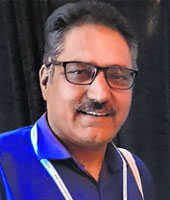Shujaat Bukhari was probably killed to silence a voice of a free-thinker and to scare others like him

Aasha Khosa
Senior journalistShujaat Bukhari’s cold-blooded murder by terrorists in Srinagar’s busiest quarter is a chilling reminder of how journalists are among the most vulnerable targets in a conflict situation. Bukhari’s rise from a salaried journalist to the owner-editor of an English newspaper in a short span of time was the envy of many. He was ambitious and keen to play even bigger roles in life. Being articulate, Shujaat was the most sought-after Kashmiri journalist in the seminar circuits of New Delhi and even abroad and part of the back-channel efforts to make India and Pakistan settle Kashmir on the table.Though his newspaper — Rising Kashmir — was in no way promoting the Indian interests in Kashmir, terrorists couldn’t stand his enterprising spirit and free thinking. Probably, he had been under their watch for long and the proverbial last straw on the camel’s back happened recently when he wrote an article disapproving of separatists’ spurning of New Delhi’s offer of talks. He was probably done to death in the most ghastly manner to silence a voice of a free-thinker and also to send a chill down the spine of others who are trying to join the peace-and-talk bandwagon.Bukhari’s violent death reminds me of the time when my late husband George Joseph and I reported from Kashmir under a threat to our lives. Our fault was that we had simply reported a happening and a fact. However, those holding the gun want everyone to see the situation only from their perspective and in the process, they obfuscate the truth and kill the human spirit. They tried to do the same with us.On a cold winter day, the phone in our two-room apartment in Srinagar rang and George picked it. The caller said he was from Hizbul Mujahideen and claimed the largest pro-Pakistan group had split but no local journalist was ready to publish the news. The main faction of the Hizbul had issued a handout that had been quickly canceled (verbally), apparently on instructions from Pakistan. Now, this anonymous caller — from the marginalised and smaller faction — had approached us in the hope that we will not take sides (between the two Hizb factions) and expose the truth.It was quite a story. The Indian Express, for which George was reporting, carried it as a banner; The Tribune — I worked for it back then — too carried it on the front page. The Hizbul split was one of the turning points in Kashmir’s militancy and if one goes through the archives of local newspapers today, it has never happened!The Hizbul reacted violently. It banned the circulation of The Tribune and The Indian Express in Kashmir and asked us to leave Kashmir within 48 hours.We continued to stay put and report from the Valley. Not to offend the terrorists further, George started using the Jammu dateline for his stories even as he was reporting from Srinagar. No journalist in Kashmir supported us; media activists in Delhi didn’t issue statements either. On a personal level, friends would praise us for being bold but none cared about how difficult it was for us. There were no trolls back then, but a majority of Srinagar-based journalists spread lies and propaganda about us to many visiting journalists from Delhi.One local Urdu newspaper wrote that we were ISI agents; a few days later, another one said we were IB agents. Another newspaper report claimed that George and I had received arms training in Zeevan! All this was meant to scare us and force us to leave Kashmir. George left after his office negotiated a deal with the Hizbul Mujahideen through a person who is today a member of the BJP’s national executive committee. He was transferred out of the Valley and the Indian Express resumed its circulation.I lived alone and worked for another year from Kashmir. Believe me, life wasn’t easy. To even buy veggies and groceries, I had to plan my camouflage of the day. To beat my loneliness and to vent my anger against what had happened to our lives, I started working hard on my stories. I was doing well and not giving a clue to anyone on my routine. And, then came reports in newspapers that I was being offered scoops by the government. Before this, terrorists had managed to scare away many veteran journalists, most of them Kashmiri Hindus and non-Kashmiris, through targeted killings of Lassa Koul, Director of Srinagar Doordarshan, and PL Handoo, an officer of the state information department. A non-Kashmiri Muslim journalist working for the Times of India was manhandled in public and he left the same night. This gave rise to a bizarre situation: the international news agencies and newspapers were hugely interested in Kashmir and their search for local journalists ended with makeup artists and teleprinter operators. Over the last two decades, reporting from Kashmir has undergone a sea change; almost all regular news is being reported by Kashmiri Muslims. Shujaat was a product of this transformation and, in a way, he should have been hailed as a visionary and enterprising editor. His reporting and newspaper seemed to be in no conflict with the narrative unleashed by the separatists and yet he was killed.Prima facie, it seems that he took the threat to his life not so seriously or else he would not be moving out of his office at a predictable hour. His friends have scooped an insidious write-up about him by an anonymous writer on the worldpress.com. It was posted four weeks back and clearly targeted him for ‘betraying and making use of the movement.’Like all sane people, Shujaat Bukhari probably wanted his two children to grow and live in peace and, therefore, he tried to work for peace in Kashmir and paid with his life.
